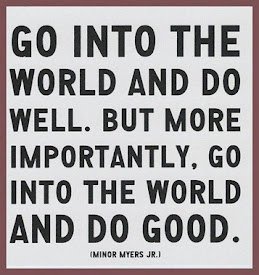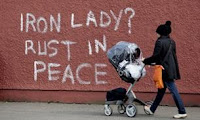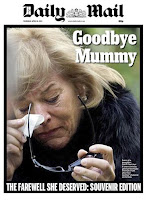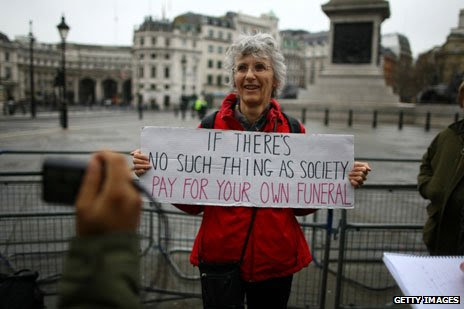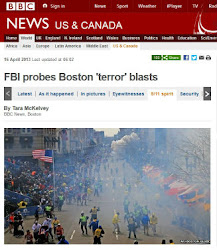 Those of us interested in self-improvement are always looking for ways to become a better person, to boost our well-being, and go after things that are bigger and larger than us. We search for inspiration, and for guidance, and we push ourselves to the very edge of limits to overcome the odds.
Those of us interested in self-improvement are always looking for ways to become a better person, to boost our well-being, and go after things that are bigger and larger than us. We search for inspiration, and for guidance, and we push ourselves to the very edge of limits to overcome the odds.We search for the laws to life to follow, life lessons to learn, taught from those that have been there and done it, and we are constantly reading as much as we can about life in an bid to get closers to ourselves.
And this is the key - not that somehow we are broken people that need fixing, or "bad" people who need "bettering" - but people that have yet to find their true self. It is not about being a better person per se; it's about being a more authentic version of your true self. Experts advise that the most sure-fire route to achieving this is through love.
In order to love someone, you must love yourself. Sometimes we feel as if our lives rely on one person. We think "If I do this, he or she will like me?" We tend to waste time avoiding those certain people, and regret it later. We miss them, yearn for their love, and even waste birthday wishes on them.
And we spend so much time waiting to be loved, hoping love will find us, searching, yearning for that special love that we feel empty and lost without it - and we distance ourselves from it. We want someone to give us love and fill us up. In my series of articles "The Science of Twin Flames" we took at look at love at the cellular level, but although that may explain the origins (or the theories for it) it doesn't explain the intensity of its effect and/or absence.
It is not that the big emotions we feel - love or lust or loyalty - are more mystical than their biological origins but exactly that they are far more material; the experiences and associations and memories we make with others repeatedly outnumber our genes. The mechanism of life may be set in motion by our genes, but the feelings we acquire are unique to our own wobbly walk through time.
Our feeling may just be metaphors of the things we colour with our perceptions, but some believe these metaphors touch the edges of actuality. That love makes sense, and no sense, equally; it throws a spanner into the mechanical works of our minds and bodies. We see this, with heartbreaking clarity, in those people we know, or read about, and in ourselves in relation to our relationships. The joke our genes and our years play on us is to leave us with a column of figures scribbled on our souls, ones that make no sense, no matter how long you squint at them or how hard you try to make them work. They don't add up, and yet they are the parts and the sum of you.
Even if we try and block it out, it cannot be denied easily, and always at a cost. For example, love and sex is a touchy subject among Israel's highly conservative ultra-Orthodox Jews. Ultra-Orthodox boys and girls are educated separately, and have little interaction with the opposite sex until their marriage night, when they are expected to consummate their union. Physical touch with the opposite sex - even something like a handshake - is only permitted with one's spouse and close family members. Access to films and the internet is often restricted.
Although Judaism regards sex as something positive, sex is only appropriate within a marital context and beyond that it's not talked about. Because of that, it's become very difficult for people to have any kind of dialogue about it. Unfortunately, that's not usually how life works well. Sex, marriage, family, love - these are not religious duties to be performed for the appeasement of some deity; they are avenues for you to discover your authentic self. Opening up to others, allows you closer inroads to the real you. But before you can train yourself to love others, and how to make love with another, you need to open up to yourself.
Loving yourself is mainly having self-respect which is the only dependable way to create love in your own life to share with others. When you expect love from an external source, and someone or something does not fulfil your void and fantasies, then you will feel worse than before. To be able to be loved, you must love and respect yourself as much as you do others.
Understanding the effects of loving yourself will only enhance your ability to love others. By doing so, you are enabling positive energy and allowing for great situations to occur in your life. And we need to create plenty of them as the mistakes of the past means in the second decade of the 21st Century we are living in fractured societies. Racism is still a prominent issue; and our politicians even make public policy amidst fiscal concerns out of our fear and mistrust (and hatred) of people culturally different than ourselves.
Our minds have narrowed in sync with our living spaces, and we feel suffocated. But the real part of us that can't breathe is our souls. We have suffocated and starved our spirit by limiting our interaction with ourselves and other people - and more importantly, by how we interact.
Technologically we invent and advance, and while doing so we re-evaluate our past, but how innovative are we in our relationships with one another. We might understand the ergonomic importance of our everyday gadgets, but how can we maximise our interactions for more productivity between people?
If you visit the United Kingdom's Science Museum, you will find four aeroplane hangars filled with a mind-boggling collection of hundreds and thousands of inventions, all of which have changed our world. Everything from steam engines to some of the very first computers. It's an inspiring place as a reminder of how inventive we can be. Behind these inventions are pioneers of science shaping our future, men and women that continue to change our world through their passion and belief in themselves.
Because it's not just about the inventions, but the people who are the driving force pushing the boundaries of science. What inspires them? How do they drive their ideas forward and ultimately end up with a ground-breaking invention? In the last 150 years, the pace of inventions, from planes to rockets to smartphones, has been extraordinary in its speed, and it shows no signs of slowing down. In the United States alone, more patents have been filed since the year 2000 than in the previous 40 years combined. More scientific papers are being published globally year on year, and more countries than ever before are getting involved.
Today anyone can innovate, anywhere in the world, whether that's in England in a garage or in Istanbul on a mobile phone. In the example of Google, it was two guys from Stanford University wrote a very simple algorithm that now is a multi-billion dollar company. In terms of great innovation, we are only at the beginning of our journey, and for those that like new ideas and change, there is no better time to be alive.
The best innovators are not the ones motivated by money, but passion; good inventions are not just good ideas, they are great passions driven by curiosity that construct the inventions of most practical use today. Revolutionary approaches require a whole new way of thinking, and scientific research is unified by not just one mind in one country funded by one state, but thousands of minds sponsored by private donors all working together for the betterment of humankind.
The speed with which ideas move around the world is one of the defining characteristics of invention today, but another is the sense of unity, community and healthy competition that spurs people to work together towards a goal. When you think about all the science that lies behind innovation today, it's so complex and so advanced it does seem impossible to stay on top of everything. So, to keep the pace of invention up, scientists have to work in a very different way to that of lone scientists in the past. Indeed the simple categories in science we remember from school have now multiplied into a complex web of interconnected fields, each with their own highly specialised subject areas.
One thing is clear - in a highly specialised world, scientists and technologists have to collaborate to create the next generation of inventions. This brings people from different scientific disciplines together, known as the interdisciplinary approach. Drawing people together is an immensely powerful way of driving innovation in 21st Century science. It opens up opportunities and avenues that previously did not exist.
This approach sees the scientific world as an orchestral piece, working together to produce something harmonious, with each individual player achieving much more than they could have done alone. This can provide a blueprint for the rest of the world, especially in politics, and in our personal lives, too. If we act as a team with a unified purpose, supporting and sustaining each other, then we can do collectively far more than any single individual. This interdisciplinary approach is a concept that once we begin to utilise on a global scale will mean we can tap into the true power of planet.
Read how to unite global consciousness.
Contributions of mind, time, money and effort are also done through the internet; the free not-for-profit exchange of ideas is known as open-hardware. The only condition is respect - to credit original owners and to use the information to further the project. This is human interaction on a whole new level; it flips the system of profit on its side, putting the focus on the goal spurred on by the combined passion of hundreds of individuals bringing their own expertise to the table in a framework of respect and unity. This makes the interaction a priority, rather than a means; and this forces us to start thinking differently.
As our inspiration comes from nature, and our understanding of the natural world, it's also in our nature to push boundaries and solve problems, and if we unify towards these aims we are on the cusp of great things. The more challenges we have in life, the more exciting life is when we rise to the challenges. Although the most important part of innovation is still having a simple idea, having a bold vision and the drive to implement it, it will materialise by increased collaboration and intellectual globalisation.
The importance of collaboration across different fields is becoming a global conversation, with many minds interacting, sharing ideas, making the seemingly impossible, possible. And the speed with which this is happening is changing our world more quickly than ever before. Today humankind is (whatever we think of the moral and ethical implications) re-engineering nature for our own benefit, working to colonise other planets, to control the power of evolution and to dictate our own destinies.
It is part of a new culture of openness and sharing that's reshaping how we look at human interaction and boosting its productivity. Thanks to the open source movement interaction is now worldwide; selfishness and disputes over price tagging ideas are being replaced - sharing is the future, where ideas are thrown out to see how they can be grown a nurtured by others. In a very real sense, love is helping to shape tomorrow's world.
This has created tension between the world of business and making money and the world of sharing for the common good, but someone somewhere has to earn something, too, and the next level of interaction, some say, will be to achieve a balance between the two - to create businesses that are driven not by money but by their ideals and the services they provide. With a severe economic crisis and a breakdown in confidence making profit and gain a generational problem, and banks becoming distant from the communities they serve, it's time for a rethink on how to reconnect business and people.
Read more about money-making gurus.
And at the heart of the open source movement is our ever-increasing connectivity. Today 2.3 billion of us are online; the internet and social networking is making us interact in different ways, shortening physical distances and allowing minds to collaborate in ways unimaginable before. The internet has become more mainstream; it's possible to connect with more people in a more profound way than ever before, on a global scale.
Some say there is a danger of becoming too dependent on the net, and rather than using it as an aid to interaction, it is taking over our lives and has begun to replace human interaction - especially in our personal relationships - or that the internet is threatening individualism via cultural globalisation. Notwithstanding that we can simultaneously be proud of our individual culture and our global family, we should not fear coming closer together. The wider the chasm between people, the less understanding there is, and the more we all suffer as a result.
Instead of allowing the net to isolate us in our homes, when used as an aid to enhance connectivity, such technologies are not a choking point in life, they help open us up to new horizons. And we need those new horizons now more than ever before. But we need to look up from our smartphones and stare at each other in the eye. We need to start to see life differently, to change the life we see.
When we look at news reports, we see the human face of war, at how death divides and loss unites. Nevertheless, violence and terrorism appear to be on the rise, as people take life indiscriminately and breed it into our young - placing them in the army to learn how to better kill at an earlier age, instead of teaching them the sacredness of life. It's obvious violent influences and alienation plays a large part as to why do some choose the path to destruction, and, worse, it seems a strong factor as to why we have become callous and cruel in pursuant of our causes.
War is easy, peace is hard; is this why so many today forgo peaceful protest? When politicians talk about temporarily suspending human rights, it's they that become the danger to society, so of course we should have a healthy cynicism about those who are so placed above us, and protest when we feel the need to make our voice heard, but do we have to kill to get a message across?
Still, is it so surprising, when we are the descendants of eras that suckled on the teat of terror-focused media, and made money out of people as though they were property? Although we are still in a great recession from which the economy has never recovered, for some it's still all about the big sell; and we have created cosmetic societies where there have been plenty of cases of high-profile people - who would think have it all - struggling to control their tempers. Even our animals need to go into rehab. It feels like we have fallen out of love with ourselves, the world, and all the lives within it.
Yet that is just one side of the story. The UK Peace Index has written that the country has become "substantially and significantly" more peaceful. Rates of murder and violent crime have fallen more rapidly in the UK in the past decade than anywhere else in Western Europe, researchers say. However, although there is no commonly accepted explanation by criminologists for the fall in violence, not just in the UK, but in many of the world's regions including the US, Western Europe, Eastern and Central Europe, why doesn't it feel like it?
We read about how insensitive we have become with our dealings with others, and how murderous - in England we have seen the biggest-ever joint prosecution of a gang over a killing of a 15 year old boy, parents murdering their children, while in America the Boston bombings themselves have been overcast by the news of shootings elsewhere in America in quick succession. And across the border teachers incensed by sweeping education reforms have attacked the buildings of political parties in Mexico's south-western Guerrero state.
Social reform changes are materialising, too, but slowly, painfully and with much protest. France is now the 14th country to legalise gay marriage after New Zealand; it is also the ninth country in Europe to allow same-sex marriage after legalisation in the traditionally liberal Netherlands and Scandinavia, but also in strongly Catholic Portugal and Spain. It has been met with strong protest, but some argue this is the most important social reform in France since the death penalty was banned in 1981.
Meanwhile others grumble that countries are becoming more "female countries". Take Australia, for instance, where the prime minister, the governor-general and the richest person are currently all women - changing its political landscape and outlook. When tens of thousands of unmarried, mostly teenage mothers, said they were coerced into signing away their children by Australia's forced adoption policy between the 1950s and 1970s, the country issued an apology to the people affected. Which shows that even though there is resistance, we are succeeding to shine a light on our areas of shame, to make apologies where necessary, and to reach out when we can.
There is a general air of reconciliation brewing in the air; and there are areas of the world that are tranquil. For instance, the Norfolk district of Broadland has been named the most "peaceful" area of the UK. Some suggest it is so, because it is a place of community. People are friendly, they look out for one another, they have a different outlook on the world. Sometimes it's a case of looking forward, not back. And if we begin to look differently at our world, we will see how there are small signs of kindness and good works going on everywhere.
We just need to take the time to look. Such as the daily trip to a local coffee shop that gives you a chance to do a small good deed, or like the American boy who send bikes to India's outcast children. These and others are signs of inspiration being put up everywhere - showing us how the human spirit can overcome challenges with dignity.
There will be times when we can feel like a blank canvas on which others project their own emotions, and this can create very strong feelings; we can become disillusioned with the world. But when that happens, look at all the ways we are getting better, too. Of course we are far from perfect; we make mistakes. And we will make plenty more. Our human history is filled with them. But everyday, there are people coming in and out of the world, we need to remember that and spend our time wisely.
Part of that means we need to respect ourselves and others, and the space which we all have to share together. It's about creating a pluralist society, where there is no particular privileged position for one colour, creed or tradition. It's not about dominating space, it's about owning our own lives, and allowing others to do the same. And never think that you're living your life for nothing. As human innovation and kindness shows, your life is a voice that, when it speaks directly to love, can change the world.
Yours in love,











 |
| 


